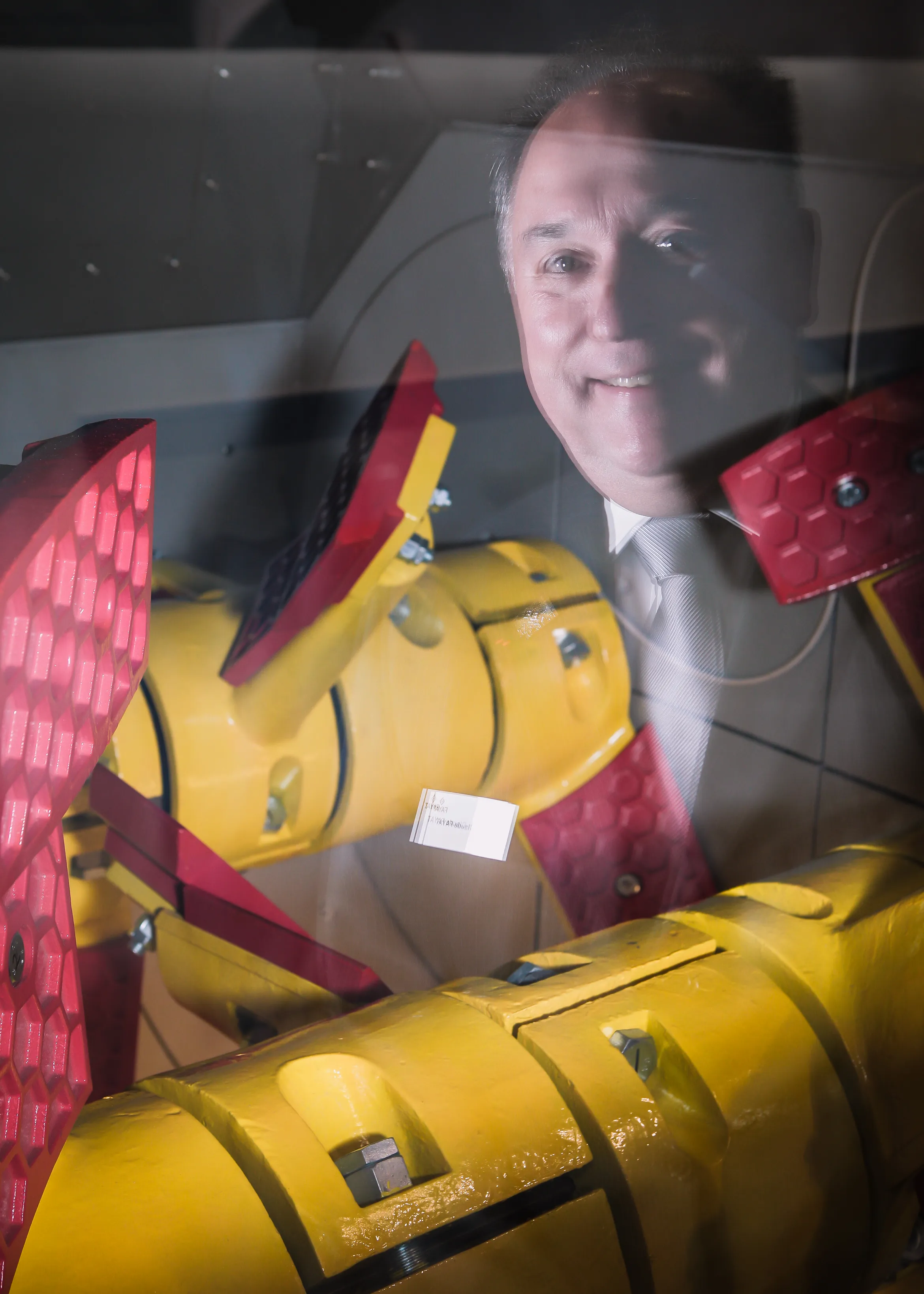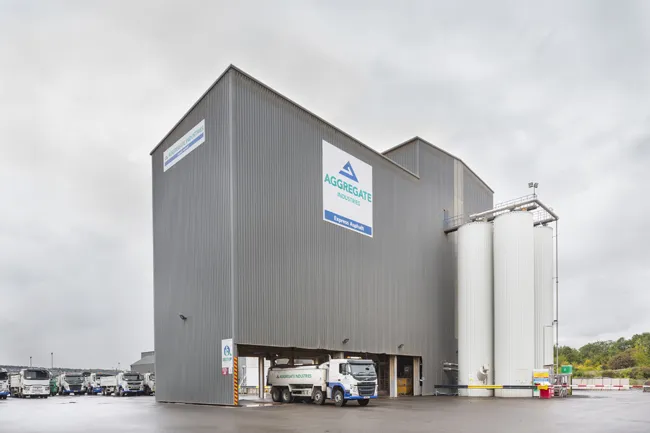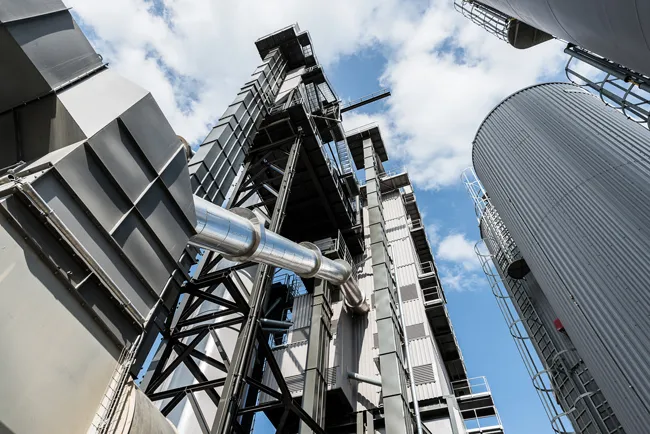Innovations in asphalt plant technology will help boost the use of recycled asphalt. Mike Woof writes. An Ammann asphalt plant located in Australia has been successful in using a high percentage of recycled feed materials. The Australian producer Downer recently created and laid an asphalt mix consisting of 99% recycled materials, including feed from somewhat unusual sources. The feed included toner from printer cartridges, tyres and glass and this is thought to be the first time a mix has been produced usi
August 14, 2015
Read time: 4 mins

Innovations in asphalt plant technology will help boost the use of recycled asphalt. Mike Woof writes
An6791 Ammann asphalt plant located in Australia has been successful in using a high percentage of recycled feed materials. The Australian producer 2679 Downer recently created and laid an asphalt mix consisting of 99% recycled materials, including feed from somewhat unusual sources. The feed included toner from printer cartridges, tyres and glass and this is thought to be the first time a mix has been produced using such a high percentage of recycled consumer goods.
Dante Cremasco from Downer said, “The higher than normal recycle content percentage was achieved using post-consumable waste materials that would typically be stockpiled or sent to landfills.”
The end product is also worth noting. “The mix itself actually performs better than a straight mix,” Cremasco said.
Downer created and laid the mix, which also included recycled asphalt (RA), during a June demonstration at its flagship Bayswater facility in Victoria. The Bayswater facility is equipped with an Ammann Universal High Recycling Technology plant that was used to produce the mix. Downer partnered with its customer, the City of Boroondara, for the demonstration.
“If we can show that producing a 99% high quality renewable asphalt is possible, then we should be able to routinely market 75-80% to our
customers,” Cremasco said. The company is hopeful that higher recycling targets are written into future project specifications. Current best practices in Australia include 30-40% renewable materials, with some limited facilities achieving higher production levels.
Downer produced 25tonnes of the mix during the demonstration, which was attended by a number of governmental officials. The mix was used on a two-way access road for a City of Boroondara sporting facility.
Mixes made almost exclusively from recycled asphalt pavement (RAP) have been manufactured previously, although this is not common practice and there are several limiting factors that make this impractical for most applications. What made this particular mix innovative, however, was the use of recycled consumer goods. These included crumbed tyres and printing toner, which acted as a polymer while crushed glass was used too and this essentially replaced sand. The RAP accounted for around 75% of the mix, while the only non-renewable material in the mix was the 1% binder.
Research conducted by Downer shows the use of the recycled materials in the feed actually improved the asphalt quality. According to Downer tests showed the material was able to deliver a 30% improvement in deformation resistance, increasing its ability to resist damage from heavy traffic. The tests also revealed a 16% increase in stiffness as well as an improved bearing capacity. There was also a greater ability for the material to act as a wearing course to carry heavy traffic. This also means a thinner surface can be placed, further reducing costs. The material also offers improved durability and resistance to fatigue cracking, due to innovative mix design according to the firm.
Cremasco commented that the paving crew which worked with the mix found that no extra measures were needed. “It’s easy for crews to place,” he said. “The mix itself had a good matrix about it.”
The firm’s Bayswater facility is equipped with the sophisticated Ammann Universal HRT and no special adjustments were made to the plant for this mix to be produced. Important factors in the production of this special mix were the plant’s recycled asphalt silos, located above the pugmill, and the twin-drum, parallel recycled asphalt drive. An important technical point is that the plant was purpose built so as to offer the option of using recycled materials other than recycled asphalt.
Downer purchased the Ammann Universal HRT about two years ago because of its fuel efficiency and ability to use up to 80% recycled asphalt. And Ammann worked closely with the Downer team on developing the mix.
According to Ammann Australia, feedback from its customers has also been important in designing and developing its latest and most sophisticated asphalt plants and allowing these units to handle special mixes and applications such as this. The advantages of this special go beyond environmental benefits. “Cost is another driver. We have an internal target to reduce cost. When we eventually get into full production mode, those savings will be passed onto the consumer.”
And those savings will be significant given that the company produces around 2.5 million tonnes of asphalt/year at its various plants.
An
Dante Cremasco from Downer said, “The higher than normal recycle content percentage was achieved using post-consumable waste materials that would typically be stockpiled or sent to landfills.”
The end product is also worth noting. “The mix itself actually performs better than a straight mix,” Cremasco said.
Downer created and laid the mix, which also included recycled asphalt (RA), during a June demonstration at its flagship Bayswater facility in Victoria. The Bayswater facility is equipped with an Ammann Universal High Recycling Technology plant that was used to produce the mix. Downer partnered with its customer, the City of Boroondara, for the demonstration.
“If we can show that producing a 99% high quality renewable asphalt is possible, then we should be able to routinely market 75-80% to our
customers,” Cremasco said. The company is hopeful that higher recycling targets are written into future project specifications. Current best practices in Australia include 30-40% renewable materials, with some limited facilities achieving higher production levels.
Downer produced 25tonnes of the mix during the demonstration, which was attended by a number of governmental officials. The mix was used on a two-way access road for a City of Boroondara sporting facility.
Mixes made almost exclusively from recycled asphalt pavement (RAP) have been manufactured previously, although this is not common practice and there are several limiting factors that make this impractical for most applications. What made this particular mix innovative, however, was the use of recycled consumer goods. These included crumbed tyres and printing toner, which acted as a polymer while crushed glass was used too and this essentially replaced sand. The RAP accounted for around 75% of the mix, while the only non-renewable material in the mix was the 1% binder.
Research conducted by Downer shows the use of the recycled materials in the feed actually improved the asphalt quality. According to Downer tests showed the material was able to deliver a 30% improvement in deformation resistance, increasing its ability to resist damage from heavy traffic. The tests also revealed a 16% increase in stiffness as well as an improved bearing capacity. There was also a greater ability for the material to act as a wearing course to carry heavy traffic. This also means a thinner surface can be placed, further reducing costs. The material also offers improved durability and resistance to fatigue cracking, due to innovative mix design according to the firm.
Cremasco commented that the paving crew which worked with the mix found that no extra measures were needed. “It’s easy for crews to place,” he said. “The mix itself had a good matrix about it.”
The firm’s Bayswater facility is equipped with the sophisticated Ammann Universal HRT and no special adjustments were made to the plant for this mix to be produced. Important factors in the production of this special mix were the plant’s recycled asphalt silos, located above the pugmill, and the twin-drum, parallel recycled asphalt drive. An important technical point is that the plant was purpose built so as to offer the option of using recycled materials other than recycled asphalt.
Downer purchased the Ammann Universal HRT about two years ago because of its fuel efficiency and ability to use up to 80% recycled asphalt. And Ammann worked closely with the Downer team on developing the mix.
According to Ammann Australia, feedback from its customers has also been important in designing and developing its latest and most sophisticated asphalt plants and allowing these units to handle special mixes and applications such as this. The advantages of this special go beyond environmental benefits. “Cost is another driver. We have an internal target to reduce cost. When we eventually get into full production mode, those savings will be passed onto the consumer.”
And those savings will be significant given that the company produces around 2.5 million tonnes of asphalt/year at its various plants.








